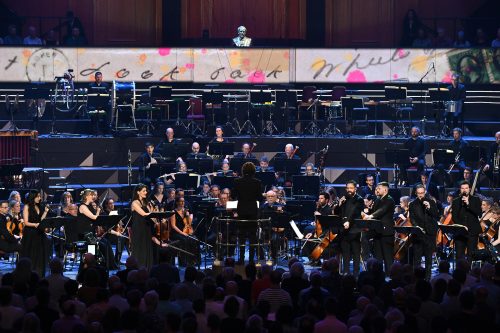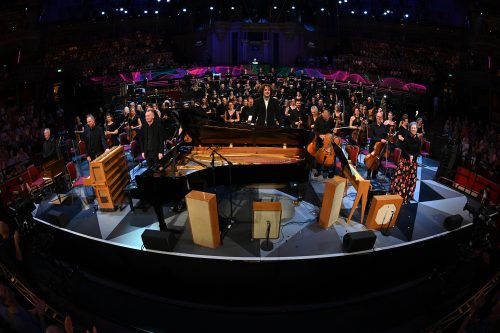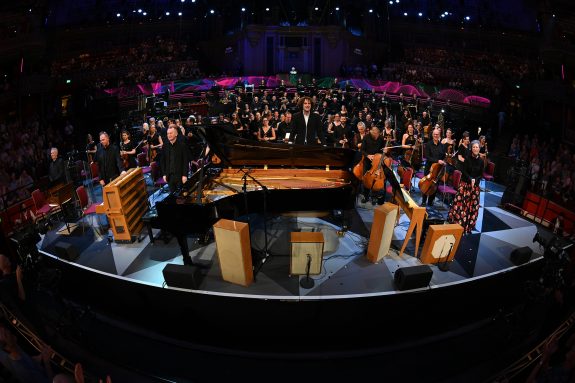
 United Kingdom PROM 15 – Clyne, Messiaen: Steven Osborne (piano), Cynthia Millar (ondes martenot), Jody Elff (live electronics), The Swingles, BBC Philharmonic / Nicholas Collon (conductor). Royal Albert Hall, London, 30.7.2024. (CK)
United Kingdom PROM 15 – Clyne, Messiaen: Steven Osborne (piano), Cynthia Millar (ondes martenot), Jody Elff (live electronics), The Swingles, BBC Philharmonic / Nicholas Collon (conductor). Royal Albert Hall, London, 30.7.2024. (CK)

Anna Clyne – The Gorgeous Nothings (world premiere)
Messiaen – Turangalîla Symphony
Having enjoyed Masquerade, Anna Clyne’s take on London’s eighteenth-century pleasure gardens, a couple of years ago, I was very much looking forward to The Gorgeous Nothings, her response to Emily Dickinson’s poetry: this BBC Prom began with its world premiere, performed by the BBC Philharmonic, with whom Clyne is Composer in Association. About Messiaen’s Turangalîla Symphony, which was to follow, my feelings were mixed: more on this later.
There are three elements to Clyne’s setting: two of them, in this performance, from America, Clyne’s home. The words were entrusted to The Swingles (welcome visitors); the orchestra provided the musical commentary, augmented by Jody Elff’s live electronics. The results were not merely accessible (as one expected), but beautiful. Apart from one or two effects, the electronics were not at all invasive: they were used chiefly to manipulate the acoustic, to provide what I am tempted to call sonic bloom (while The Swingles were singing something close to Renaissance polyphony we might have been in a cathedral). In the vast intimacy of the Royal Albert Hall the effect was magical (a word I over-use: but what other word will do? Music in the presence of an audience is, or should be, a form of magic).
Clyne’s chosen poems and fragments by Emily Dickinson are a reflection on an implied narrative, enclosed by her poignant appeal to a world that has never noticed, let alone validated, her life: ‘This is my letter to a World That never wrote to Me’. Along with the sense of loneliness and isolation is an equally poignant meditation on the brevity of life, and the inevitability with which our moments of intense experience slip immediately into the past. Clyne’s orchestral accompaniment is chameleonic: simple, elaborate, powerful, rich, chorale-like, rhythmically insistent, chattering, swirling, pastoral and so on. In the fourth song the music seemed within hailing distance of Mike Oldfield country, and none the worse for that.
As the ending approached the words and music seemed to me to evoke two farewells: Prospero’s (’We are such stuff as dreams are made on’) and the funeral march in Der Abschied (the last song of Mahler’s Das Lied von der Erde). Clyne chooses to cap her powerful conclusion with a shining and apparently triumphant major chord.
The appearance of Nicholas Collon and The Swingles to perform the work triggered an almost raucous welcome from the audience: they were even more vociferous in their approval at the end. The buzz in the hall throughout the interval was such that the small but valiant band of seasoned Prommers who make a nightly appeal in aid of musical charities was all but inaudible. I haven’t witnessed that before: it was testament, I suppose, to the excitement a live performance of Messiaen’s unbridled extravaganza generates. I have only heard it in concert once, and on that occasion André Previn was conducting. A long time ago: plenty of time – decades – for my prejudices about the piece to harden.
It is just too schmaltzy. All that high-flown stuff about physical and spiritual love is couched in music that is the equivalent of bad Catholic statuary. The love theme is a sweetened version of the first four notes of the Tristan Prelude (this is one – and much the biggest – of a trilogy of works related to Tristan und Isolde) capped by a falling fourth like a comfortable post-coital sigh, harmonised for a Palm Court orchestra or a Wurlitzer. Too much bling. In my memory, the sixth movement – The Garden of Love’s Sleep – is the worst offender: I have always suspected that when the young Pierre Boulez described the work as bordello music he had this movement in mind.
Imagine my surprise, then, when it was this movement that switched me back on to the work. Collon kept the swooning strings very much in the background; we were free to concentrate on Steven Osborne’s piano playing – birdsong, pools of silence, tiny detonations like necklaces falling into water. It was mesmerising. Of course I had enjoyed the previous movement, the cheerfully crazy Joy of the Stars’ Blood – especially the demented piano break just before the statue theme lumbers in – but it was here that I really started to listen. I enjoyed Turangalîla II and Turangalîla III, madcap rhythmic experiments like some crazy Heath Robinson contraption likely to explode at any moment; The Development of Love, with returns of the statue theme, the flower theme and that blowsy love music: and the finale, setting off like a breezy cowboy soundtrack with clopping woodblock. There was a palpable thrill in the hall as the end approached: the final chord was satisfyingly long and loud, and so was the ovation.

Plaudits to Collon and the BBC Philharmonic for their total commitment; Collon seemed tirelessly tuned to the music’s cosmic energy, and the players tirelessly responded. Kudos too to the busy row of keyboards – Cynthia Millar, veteran ondes martenot player, Ian Buckle on celesta, Paul Janes on keyed glockenspiel and Osborne – for me the hero of the performance – at the piano. He will be back on Sunday for Rhapsody in Blue.
So, a memorable evening: the heat adding a touch of delirium to the general excitement. And yes, it is a perfect work for the Proms, not least for its theatricality and visual splendour, with eight of the percussion players (there were more down the side) above the rest of the orchestra in an unbroken line along the top step. I think my abiding visual memory will be of seven of them, just before the end, brandishing large, brightly coloured pairs of maracas above their heads.
Chris Kettle
